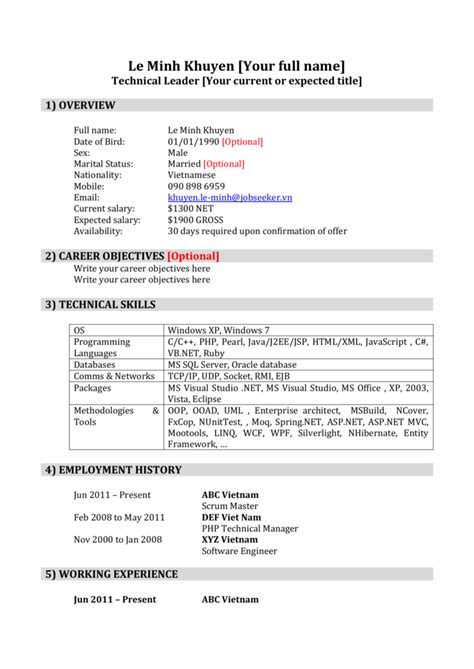Tips For Stating Expected Salary On Resume

When applying for a job, one crucial piece of information that employers often require is your expected salary. Stating your expected salary on your resume can be a delicate task, as you want to ensure you are not underselling yourself or pricing yourself out of the job. Here are some tips to help you navigate this process:
1. Research the Industry Standard
Before stating your expected salary, it’s important to research the industry standard for the role you are applying for. Look at salary surveys, job postings, and industry websites to get an idea of the typical salary range for similar positions. This will help you determine a realistic and competitive salary expectation.
2. Consider Your Experience and Skills
Your experience and skills play a significant role in determining your expected salary. Consider your years of experience, relevant qualifications, and any specialized skills or certifications you possess. These factors can justify a higher salary expectation and should be highlighted on your resume.
3. Assess the Job Requirements
Carefully review the job requirements outlined in the job posting. Identify the key skills, qualifications, and responsibilities required for the role. If you meet or exceed these requirements, you can use this as leverage to support a higher expected salary.
4. Determine Your Value
Think about the value you can bring to the company. Consider your past achievements, contributions, and any measurable results you have achieved in previous roles. Quantify your accomplishments and showcase them on your resume to demonstrate your value. This can help justify a higher salary expectation.
5. Be Realistic
While it’s important to aim high, it’s also crucial to be realistic about your salary expectations. Take into account factors such as the company’s size, location, and industry. Consider the current economic climate and the overall demand for the role. Being realistic will increase your chances of landing the job.
6. Mention Salary Expectations in a Cover Letter or during the Interview
Instead of stating your expected salary directly on your resume, it’s often better to mention it in your cover letter or during the interview process. This allows you to provide context and discuss your salary expectations in more detail. It also gives you an opportunity to showcase your qualifications and negotiate your salary based on your value.
7. Use a Salary Range
Instead of providing a specific number, consider stating a salary range on your resume. This gives you some flexibility and allows for negotiation. Make sure the range you provide is reasonable based on your research and qualifications.
8. Be Prepared to Justify Your Expectations
During the interview process, be prepared to justify your expected salary. Be ready to discuss your qualifications, experience, and the value you can bring to the company. Provide examples of your past achievements and how they align with the requirements of the role. Showing that you have done your research and can support your salary expectations will increase your chances of success.
9. Seek Professional Advice
If you’re unsure about how to state your expected salary or negotiate your compensation package, consider seeking professional advice. Career coaches, recruiters, or human resources professionals can provide guidance and help you navigate the salary negotiation process.
10. Update Your Resume Regularly
Finally, remember to update your resume regularly to reflect any changes in your qualifications, skills, or experience. This will ensure that your resume is always up to date and accurately represents your value and expected salary.
Conclusion
Stating your expected salary on your resume requires careful consideration and research. By understanding the industry standard, assessing your experience and skills, and justifying your expectations, you can confidently state your expected salary and increase your chances of landing the job.
Frequently Asked Questions
- Q: Should I include my expected salary on my resume?
- Q: How do I determine a realistic salary expectation?
- Q: Can I state a salary range instead of a specific number?
- Q: How can I justify my expected salary during the interview?
A: It’s generally recommended to mention your expected salary in your cover letter or during the interview process rather than on your resume. This allows for more context and discussion.
A: Research the industry standard, consider your experience and skills, assess the job requirements, and be realistic about factors such as the company’s size, location, and industry.
A: Yes, stating a salary range provides some flexibility and allows for negotiation. Make sure the range you provide is reasonable based on your research and qualifications.
A: Be prepared to discuss your qualifications, experience, and the value you can bring to the company. Provide examples of past achievements and align them with the requirements of the role.

